The Cockerel









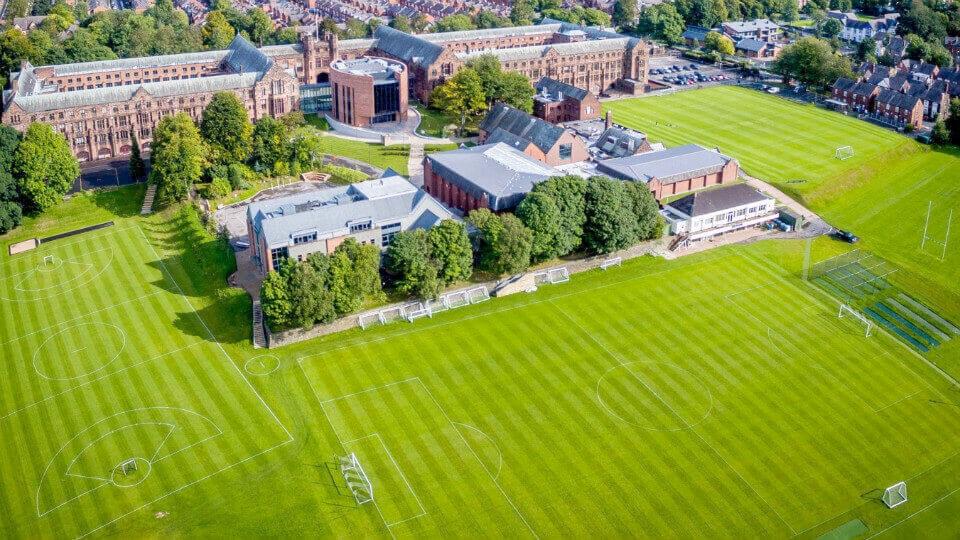
Recent events have brought to the forefront of all our minds the issue of systemic racism and the way in which the assumption of white superiority can pervade thinking consciously and unconsciously. We recognise that individuals may not see themselves as racist, but they can still benefit from systems which privilege white faces and voices. As in every school, it is our role to fight ignorance and inequality. In addition, we seek to promote diversity and inclusion, which are integral to the aims of the Foundation. We have been impressed by how many current pupils, members of staff, and alumni have been vocal in condemning racism in all its forms. In turn, we have committed to undertake a thorough review of current practices in order to evaluate where changes are necessary.
In the short term, we have or will be taking these actions:
In the Boys’ Division, Headmaster Mr Britton led an assembly focusing on racism and the events of recent days.
In the Girls’ Division, a recent Heads of Departments’ meeting focused on the curriculum with regard to BAME culture to increase provision in this area.
At the start of the next academic year, the Headmaster and Headmistress will lead a consultation with current students and parents, to which members of the alumni body will be invited to contribute. The Heads are currently looking for outside organisations with which they can work so that such a consultation is meaningful and well-focused. In the meantime, Old Boys and Old Girls are invited to share their experiences by emailing BLMConsultation@boltonschool.org
Although this is not an exhaustive list, we expect the review will explore issues such as the diversification of the History curriculum, increasing pupil exposure within the English curriculum and elsewhere to a diverse range of texts written by BAME authors, further developing our PSHEE curriculum in its consideration of racism and discrimination, developing our welfare provision for BAME pupils, looking again at how we might encourage strong applications for employment from the

BAME community and providing ongoing training for staff on promoting diversity and the elimination of unconscious bias.
In the longer term, we need to address the fact that, whilst the make-up of our student body across both Divisions reflects that of the local community in terms of ethnic breakdown, our staff community is not reflective of the pupil body. This is something we actively try to combat in any appointment through the way in which we word job adverts and in our recruitment processes. We shall continue to look at ways in which we can encourage wellqualified BAME students to join the teaching profession and to
apply to work at schools within the Foundation. We have started to see some excellent candidates coming through Initial Teaching Training schemes which we host.
As a Foundation, we acknowledge our role in actively dismantling systemic racism and prejudice within society. We are intent that our response to events of the past two weeks should be meaningful and have long-term impact, and encourage all members of our community to continue to engage positively with this process in order that that will be the case.


Our Headmaster and Headmistress recently received an open letter from a group of Alumni asking that the School consider its educational provision in the light of the Black Lives Matter protests. This is their response, with the Alumni letter below it.

Dear Authors, We hope you and your families remain safe and well at this challenging time for us all.
We thank you for your email dated 9 June, and for the open letter attached to that message. We have been impressed and proud at how the School’s Alumni, current pupils, parents and staff have grasped the moment and condemned racism in all its forms, and welcome your participation in this discussion.
Whilst we share your sense of urgency and have already started to engage current pupils and to think about curriculum reviews, we do want our response to events of the past two weeks to be meaningful and have long-term impact. On Monday, 8 June, we announced our intention to hold a consultation with current
students and parents to address this subject. This will commence at the start of the next academic year and will be led by the Headmaster and Headmistress with the oversight of an external organisation experienced in such matters. We intend, as you hope, to collaborate with all our stakeholders to consider how we might improve things in school and also how we might contribute to the critical work which will need to take place nationally. The School’s Alumni have already been invited to contribute to this process by sharing their experiences, in confidence, by emailing BLMConsultation@boltonschool.org, and we would welcome the involvement of you and any signatories to the open letter who wish to engage with this process.
Although this is not an exhaustive list, we expect the review will explore issues such as how we can further develop consideration of racism and discrimination in the curriculum, developing our pastoral and welfare provision for BAME pupils, looking again at how we might encourage strong applications for employment from the BAME community and providing ongoing training for staff on promoting diversity and
the elimination of unconscious bias. Our thinking is clearly aligned with yours on the areas where the School could improve and we shall ensure that all of the points noted in your letter are answered in the consultation.
The values of diversity and inclusion are integral to the aims of the Foundation and we acknowledge our role in actively dismantling systemic racism and prejudice within society. We believe that this consultation will help us to evaluate where changes are necessary, and, crucially, provide a clear framework and timescale for how its recommendations for change should be implemented.

We hope that our consultation will be published by the end of September and in order to ensure the widest possible engagement, we will make this message – and future communications relating to the consultation – available on our website.
Sue Hincks, Headmistress Philip Britton, HeadmasterWe are writing to you as students, alumni, parents, and members of the Bolton School Community regarding our education and curriculum. As we are sure the School is aware, the conversation surrounding the Black Lives Matter movement has been brought to a head in recent weeks by the murder of George Floyd and the subsequent protests across the world. It was positive to see that the School invited alumni to share their experiences of racism at the School and to give recommendations for positive changes upon which the School should reflect. We wholeheartedly support the School in any efforts to combat racial prejudice. However, this is only the first step in what must be a sustained, long-term commitment to anti-racism at Bolton School.
The most fundamental way that the School can take steps to tackle both casual and systemic racism is by implementing changes to the curriculum. The perspectives to which we expose pupils must be inclusive and representative of the diversity that exists in British society, and indeed Bolton School.
On the 1st of June 2020, The Impact of Omission survey was launched, finding that:
• 86.2 % of school pupils were educated on the Tudors indepth as part of their curriculum, whereas only
• 9.3% learned about the role of slavery in British Industrialisation;
• 72.2% learned about The Great Fire of London, whereas only 7% learned about Britain’s colonisation of Africa
• 71.5% were taught about the Battle of Hastings, whereas only 5.2% learned about the role of BAME soldiers in WWI and II; and
• 61.5% of students said that the role of slavery within the British Empire was only briefly mentioned or not at all.
The findings of this survey strongly reflect our experiences at Bolton School. It should not be the case that students have to teach themselves these vital topics. The School website states that it will prepare students “to make their way in the world and
make a difference for good”, and learning about the foundations of what upholds much of today’s systemic racism is an integral aspect of this. Bolton School must engage more thoroughly with the history of the British Empire as well as the contemporary reality of race relations in the UK, not just in the US. Indeed, the history of Bolton School is itself tied to colonialism: William Hesketh Lever profited from a Lever soap factory in the Belgian Congo which employed Congolese people into a cruel system of forced labour. By educating younger generations on colonialism, civil rights, and race relations, we give them a fuller view of British history and culture and the resources to build their own opinions. In order to support changes in curriculum, structural adjustments are also vital. At Bolton School, there is a significant proportion of the student body that is of BAME origin. It is important and pressing that the teaching and support staff are representative of the student body. During our time at the School, there were few BAME teaching staff and very few BAME members on decisionmaking committees or boards. We are sure Bolton School is aware of the importance of role models in the personal and academic development of young minds. Therefore, we urge change in the form of inclusive and active recruitment of staff in order to widen the Bolton School community and enrich the lives of those reached by its education system.
We urge the School to take the following steps to address this issue and answer our questions as to how this will be carried out.
�. ��������� ��� ������� ����������
We ask that the Key Stage 3 History curriculum be revised to shed light on the British Empire and its consequences. This should include the post-WW2 Windrush generation and modern BAME British history, such as Britain’s Black Power movement. ��� ���� ������ ����� �� ������� �� ������ �� �������� �������������� �� �������? �. ��������� �������� �� ����� ��� �������
We request that British BAME writers are introduced to the Key Stage 3 curriculum and recommended reading lists as students would benefit from an expansion to the range of texts taught in these subjects. More books from BAME authors should be available in libraries across the School, with clear and obvious signposting. This would allow pupils to explore the diversity of thought and representation often displayed in these books. Particular books that come to mind are “The Good Immigrant" by Nikesh Shukla and “Why I’m No Longer Talking to White People About Race” by Reni Eddo-Lodge.
�. ����� ����-������ ���� ���� �������
We request that discussion of racism and discrimination become a compulsory and significant part of the PSHE curriculum. This
should be done in a non-tokenistic manner; PSHE classes should allow open discussion of how to identify and fight racism in our daily lives. For example, students should be made aware of issues such as microaggressions, unconscious bias and the gravity of racial slurs. This should include specific teaching and reflection upon the damage inflicted on fellow students by casual racism passed as “banter”. ��� ���� ����������� ��������� �� ���� �� ������� �� ������ ���� ������ ��� ����� ����� ���� ���������� ����? ��� �� ��� ������ ��������� �������� ���������� �������� ��� �����? �. ������� ��� ������� ��� ��������
We request that the School provides more resources and support to its Welfare services, particularly for BAME students. The School should begin a dialogue with BAME pupils about their experiences, taking the time to listen and consider actioning any suggestions they make. We strongly encourage the School to create an anonymous platform for BAME pupils to report incidents and concerns. Furthermore, it is imperative that the School provides all students with the tools required to report any form of racism, overt and hidden. Equally, it is important to equip the staff to intervene in situations of covert racism. This would
foster an honest, open environment for everyone. For example, the School’s highly successful bursary campaign supports many of the School’s BAME students and it is vital they feel welcomed. ���� ��� ��� ������' � ������� ������������ ��� ����������� ���� �������� ��� �����. �. ��������������� �� ��� ����������� �� ����� ��� ������� �������� �� ��� ������’ � ������.
We understand the school runs a guest lecturer program, however, this does not adequately provide a platform for highly successful BAME voices. Bolton School teachers are extremely influential in the lives of the student body. As such it is vital that the staff are representative of the backgrounds and aspirations of the students. All students deserve to have role models that are reflective of their own background. ���� ��� ��� ������' � ������� ����� ��� ����� ���������? ��� �� ��� ������ �������� �� ������ ����������� ������ ���� ���������� ������ ���� ������� ����������� �� �����? �. ������������ ���������� ��� ������ ���������
We request that the School’s disciplinary protocol for incidents of racial discrimination and harassment is reviewed to ensure that necessary action is taken where such incidents arise. We
recognise that students may not always understand the wider consequences of their individual actions. Therefore, we ask that this protocol not only commits to punishment but also to extensive education to explain why such behaviour and thoughts are damaging to society at large. ���� �� ��� ������' � ������� �������� �� ���� ���� ����?
We thank you for taking the time to read this letter. We look forward to the opportunity to discuss these issues further and hope you will join us in taking action. We understand Bolton School may consult with independent bodies in order to guide their approach to tackling the issues raised above. We hope that, as one of the leading independent schools in the country, Bolton School can set an example by implementing such changes. Other schools will follow, and we will be taking progressive steps towards deconstructing the racist fabric of our society, beginning with the mindsets of its young members.
We appreciate that these requests are by no means exhaustive of the steps needed to be taken by the School.
����� ���������,
������,
Current and former Bolton School students





Year 7 boys at Bolton School enjoyed a celebratory round-up of the year’s Bronze Arts Award project, following their Prizegiving assembly in which Billy Minshull won the Creativity Prize for top Arts Award portfolio. During the session, which gave an opportunity for the boys to share and reflect on their work, there was creative industry input from Old Boys Jonny Ashton, a TV documentary maker; Robin Partington, an architect, famously of the Gherkin; and Mark Radcliffe, TV and radio broadcaster, author and musician. A celebration summary video was shown and there was peer review activity, as well as the creation of video advice messages to incoming Year 7s.
The Arts Award programme is a range of unique qualifications that supports young people to grow as artists and arts leaders, inspiring them to connect with and take part in the wider arts world through taking challenges in an art form - from fashion to digital art, pottery to poetry. All boys in Year 7 are guided through the Bronze Award at Bolton School,
The year's programme has included: arts carousel taster sessions in SPACE; research projects on a broad range of arts and culture professions, including focuses on parent arts practitioners and alumni creatives; a review of skills and subsequent reflection on school concerts, gallery and theatre visits and arts experiences streamed online during lockdown; and guided independent project work at home during the period of remote learning and remote arts enrichment sessions in which boys have worked on mime, fictional news reports, composing to film and comic strip metamorphoses.
Art Award Coordinator Miss Sherry said, 'I have been hugely impressed with the variety of creative ideas Year 7 have produced
this year. The consistent effort that has been applied both in school and at home has resulted in some high quality projects.'


Miss Lord, Director of Creative Learning, commented that, 'it has been great to see boys' independent learning skills flourish over the course of the year and a pleasure to witness the family arts collaborations resulting from the boys' work at home. I offer a huge thanks to parents and siblings who helped boys to complete their skills shares; we've seen lots of wonderful videos of boys sitting alongside family members to teach them many things, including new animation skills, how to play pieces of music and drawing skills.
We offer Silver Arts Award as boys move into Middle School; I'm excited to see what else this talented year group produces as they dig into all the creative arts enrichment on offer."


This year saw the launch of a new competition, labelled ‘Economic Horizon’, aimed at Year 12 economists. It consisted of teams, from independent schools across the North West, submitting their take on the task set. I was fortunate to participate in a team consisting of Omar Hasan, Nathan Burudi, Michael Wong and Charlie Middleton. The brief told us to devise and communicate the best analysis of the current UK economy and to prescribe the best policies for achieving its economic objectives.

Entries were produced and submitted digitally, consisting of one pdf with a voice over, lasting a maximum of ten minutes. Given the situation with Covid-19, economic policy is very much in the limelight, providing much to discuss, but it also creates a challenge, to tackle an unprecedented event in detail, within such limited time. The main issue was uncertainty, with the future being entirely uncertain. We had to decide on whether controlling the National Debt and our budget deficit was an issue to prioritise, which we decided against, a choice heavily influenced by the views of Paul Krugman. The existence of a second wave to the pandemic was another factor to weigh up, with terrible

consequences should it be mishandled. We also had to look for the optimal policies to deal with the aftermath of the current recession. Our recommendation was a large package of infrastructure spending to help get the economy back on its feet, whilst maintaining the furlough scheme for the foreseeable future. This would have multiple effects, chief among them being economic protection during a second wave and a strong boost to help the economy grow once again.
The competition was set up by the Economics Treasury, run by Nick MacPherson and Andrew Crook, consisting of multiple rounds all judged by former senior economists at Her Majesty’s Treasury. We, as a team, were extremely grateful for the opportunity to participate, as well as honoured to be judged by economists of such prestigious backgrounds. Looking forward however, only time will tell if the polices enacted by our real counterparts will be the source of revival for our economy.

On 25th June, the School commemorated the 75th Anniversary of the end of World War Two by holding a World War Two themed day. All departments created a wonderful array of resources that showed how World War Two impacted their subject. The boys were asked to research and learn many key elements of the conflict.
In History, they created their own virtual museums, in languages they learned about the impact of the war on that country, sciences saw investigations in medical developments, synthetics and the bouncing bomb. Geography allowed them to look at how mapping influenced the D-Day landings while Classics looked at symbols of power. English focused on poetry, and Art encouraged the boys to create their own piece of work symbolising the war.


The day provided the opportunity for the boys in all year groups to see the complexity of World War Two and challenged them to think about the impact it had. While this is a very serious topic, the day was delivered in a thoroughly enjoyable way for the boys and staff. It would not have been possible without each department throwing themselves into it, for which I am extremely thankful.




The collective talents of the boys, the Music department staff and the Marketing department combined to produce our first Virtual Concert with 12 soloists lasting just over 23 minutes. (Click here to listen.) This took place on Tuesday 16th June and it was followed a week later, by a second concert, this time with 15 soloists. (Click here to listen.) We were delighted to see all the year groups represented and we were particularly proud of all the performers, who went to great efforts to make these concerts such a big success.
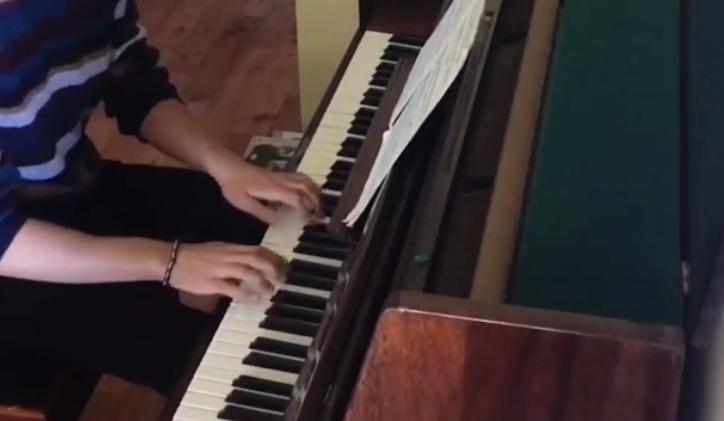
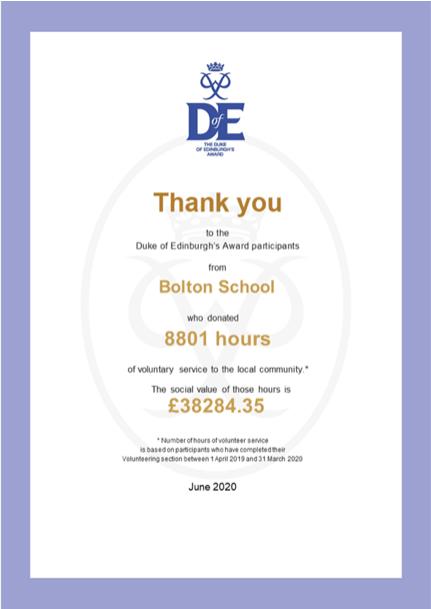

Bolton School has this week received a certificate commending pupils for their Duke of Edinburgh volunteering endeavours. Whilst undertaking their Bronze, Silver and Gold Awards, girls and boys have racked up 8,801 hours of voluntary service to the local community or the equivalent social value of £38,284.35. The hours were committed by students from both Divisions between 1 April 2019 and 31 March 2020.
Sue Hincks, Headmistress of the Girls’ Division, said: “This is a fantastic achievement and very much in line with previous years. The DofE qualification dovetails well with our ethos of working with and in the local community. Ordinarily, we hold a Spring DofE celebratory evening for pupils who have achieved their award in the past year. Obviously, due to Covid-19, this did not happen this time round but the certificate reminds us of the outstanding effort put in each year by a large number of students. All pupils, across both Divisions, undertake the Bronze Award, a third to half then go on to complete their Silver Award and half of those will complete Gold Awards.”
Headmaster of the Boys' Division Philip Britton said: "The Duke of Edinburgh’s Award provides challenge and learning, developing individuals’ leadership and teamwork skills and cementing friendships. Many volunteer locally at the likes of Bolton Hospice, Derian House and Bolton Lads and Girls Club, whilst others undertake their assignments further afield, including overseas. In recent years, the work that girls and boys undertake in the community has been integral to us winning both the TES Independent School of the Year Award and the Queen’s Award for Voluntary Service

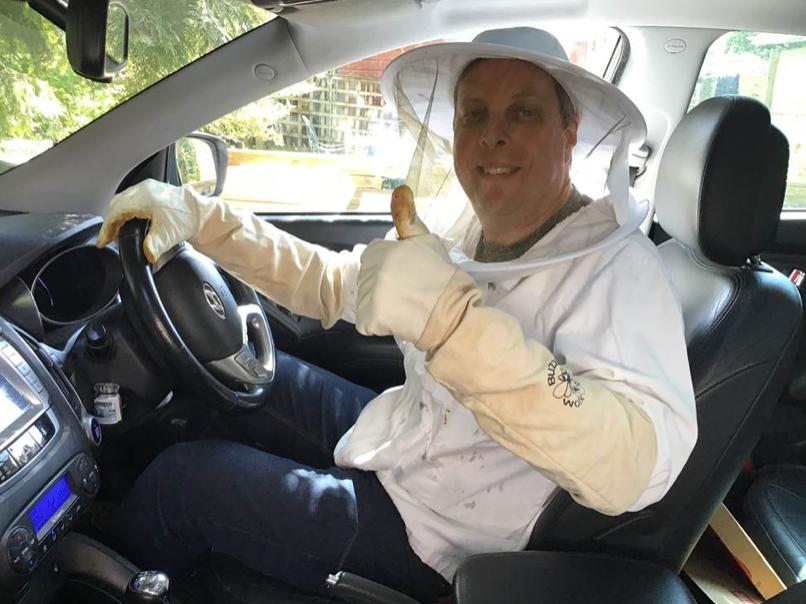
Bolton School Beekeeping Club has donated ten jars of honey to Urban Outreach, who, with the support of Bolton Council, are preparing food packages for those families most in need during the Covid-19 crisis. In addition, ‘Butchart’s Bradshaw Bees’, set up by DTE teacher Mr. Butchart, donated five more jars to the cause.
Bolton School bees have been moved off-site and are now in Mr. Butchart’s back garden. The hives had to be sealed up early in the morning before the bees started flying and packed into Mr. Butchart’s car. They were driven though Bolton and, as you can see from the picture, as Mr. Butchart was wearing his beekeeping gear, it attracted more than a few turned heads from people who clearly thought he had taken the PPE issue just a little too far! He took five hives home, which meant he had 25,000 bees in the back of his car!

Instead of having a few hives to look after, Mr. Butchart has nine, which is definitely more than he or his neighbours were expecting this summer. At least the apple and pear trees should be well pollinated, along with every other crop in a two mile radius!


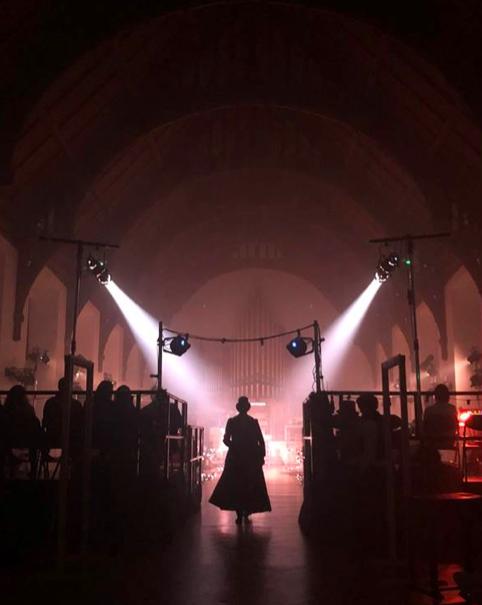
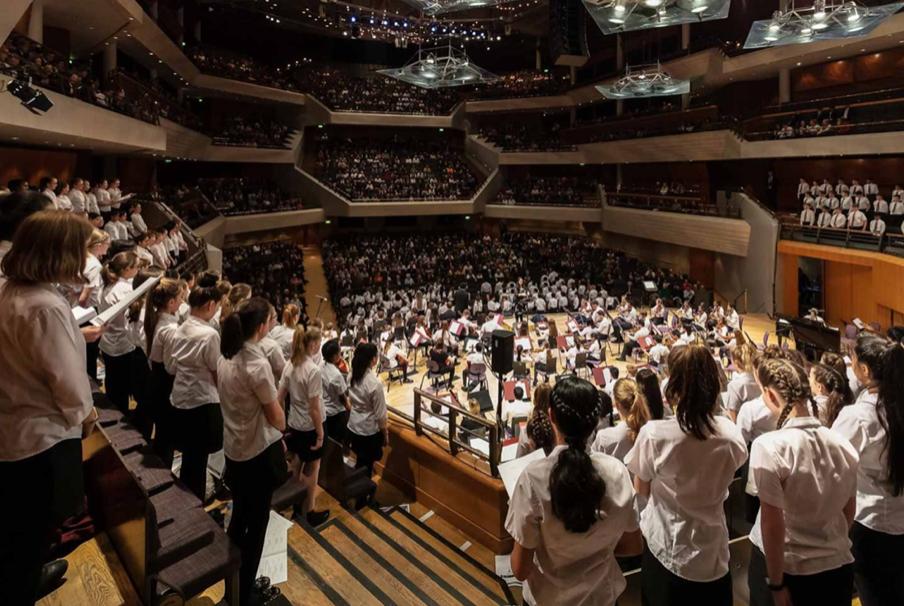
The Boys’ Division at Bolton School has published its Creative Learning Programme (CLP) for the next academic year. The programme is designed to drive school-wide arts and culture participation as well as broad creative engagement in the local community and region. The pamphlet, which can be downloaded as a pdf here (or viewed online here), provides information about indicative arts and culture enrichment activities for the school year, in addition to those delivered by the academic and pastoral curriculum. It includes longstanding staples such as annual theatrical productions and concerts; new projects with longstanding cultural partners and projects that explore and critically respond to cultural heritage and contemporary cultural issues.
The CLP is continuously evolved to promote innovative ideas and practice across the key elements of school-wide and school community participation; community participation; creative development, including skills, training and work experience; cultural connections via cultural industry partnerships and community collaborations; and research and development, including continuous scoping and development of new opportunities to expand, elevate and improve the programme. The CLP actively engages with and promotes the foundation’s vision and policies regarding equal opportunities and diversity, participation and engagement.


Ms Naomi Lord, Director of Creative Learning and Partnerships, will become one of eighteen committed professionals on the Royal Opera House Bridge's national Leaders for Impact programme. The year-long project seeks to progress professionals’ impact upon cultural learning and practice by challenging their thinking and developing new skills, knowledge and networks in order to work and lead more effectively. The programme aims to empower its fellows to bring about change on a whole school, local and national level.
Ms Lord said: “I am delighted to be part of this project. The range of 'schools together', DfE and civic work that has already come out of the programme is very exciting. It is a privilege to be in such a strong position to advocate for progressive cultural learning."
The first virtual sessions begin in September as participants start to develop innovative approaches to problem solving, share inspiration through peer learning, and pursue a tailored programme of knowledge and practice-based learning.
Ms Lord also represents the Boys’ Division at Bolton School as a SLiCE fellow – a Specialist Leader in Cultural Education – via Curious Minds. The School is thereby partnered with Manchester International Festival and The Factory. Work within this project will draw together schools across Bolton to examine young people's access and relationship to arts and culture, to work on removing

barriers to participation and to promote young people's understanding of creative skills and creative industry careers. The project will also work towards a shared language for skills across educational and industry settings, locally.
Ms Lord continued: “Arts and cultural activities are an absolute staple of an 'all round' education at Bolton School. The Boys' Division is an Artsmark Platinum school, a partner in Bolton's Cultural Educational Partnership and a steering partner of the North West's collaborative for the development of creative skills. Our commitment to Artsmark Development is a continuous one and involves auditing our current provision, routinely updating whole-setting planning for arts and culture, implementing a responsive and progressive CPD programme, building partnerships with other settings and arts and cultural organisations and developing approaches to gathering evidence of impact and evaluating progress.
In line with the Cultural Learning Alliance, we believe that every child should have access to the benefits that arts and culture bring and we hope that we offer pupils a varied and stretching curriculum, which will help develop their creative, innovative and empathetic skills, as well as build their resilience and make their lives happier and healthier. Our cultural education calendar for the year ahead looks as exciting as ever, including pupil projects, school community events, public-facing activities and Schools Together work.”
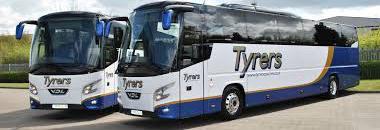

After twenty-seven very successful years, Bolton School’s ‘inhouse’ coach service, BSS Coaches, is ceasing to trade. In recent years, it has run almost half of the school’s coach routes for pupils and operated as a successful business, providing coach services to other schools, local clubs and groups as well as day trips across the region and trips abroad. During this time, the profit generated from transport has helped BSSL make sizeable donations to the School’s bursary fund which enables children from families who would otherwise not be able to afford the school fees to access the education we offer. New legislation which comes into effect from 1 August, stipulates that coaches and buses making multiple stops on a route must have disabled access. Unfortunately, the School’s coaches do not comply with this legislation and cannot be effectively adapted for disabled access. The transport business cannot operate profitably from external commercial work alone and, as a consequence, will cease running. However BSSL’s other trade from Leisure, Events, Patterdale Hall and uniform sales will continue as will BSSL’s contribution to the bursary fund from these activities.
From September, the School will enter into a partnership with Tyrers Coaches to deliver the eighteen school coach routes and transportation for many of the school’s other activities will also be provided by third parties. All the BSS Coach Drivers will be given the opportunity to transfer to Tyrers where their conditions of employment will be protected.
Clerk and Treasurer at the School, Cathy Fox, said: “It is with great sadness that we see the demise of BSS Coaches and I would like to offer a personal thank you to David Horrocks, the School’s Transport Manager, who has been with the company for 27 years, starting as a driver and successfully building the business as manager since 2004.”
Bolton School and Tyrers will work in partnership to ensure the coach service continues to be delivered safely and effectively and that school travel guidelines relating to the Covid-19 situation are adhered to. All Tyrers’ drivers operating the school routes will undergo the same stringent safeguarding checks and training as the School’s used to and, in many cases, they will be the same drivers. The operational and contractual arrangements between School and parents of pupils travelling will not change; however some routes have been merged. Consequently there will be some changes to the timing of certain stops on the merged routes which are: Culcheth with Daisy Hill, Parbold with Standish, Winwick with Leigh, and Preston with Clayton-le-woods.
All the information about coach fares, stop times and routes, including online forms to request changes can be found here. Alternatively enquiries may be made by email to the finance office at Billing@boltonschool.org.uk
Editor: Miss K.S. Wrathmell
Contributors: Mr. M. Power, Mr. J. Newbould, Miss A. Bradshaw, Mr. J.C. Moore Ms. N.R. Lord, Mr. D. Kettle, Mr. G. J. Butchart, Mr. J.C. Bleasdale
